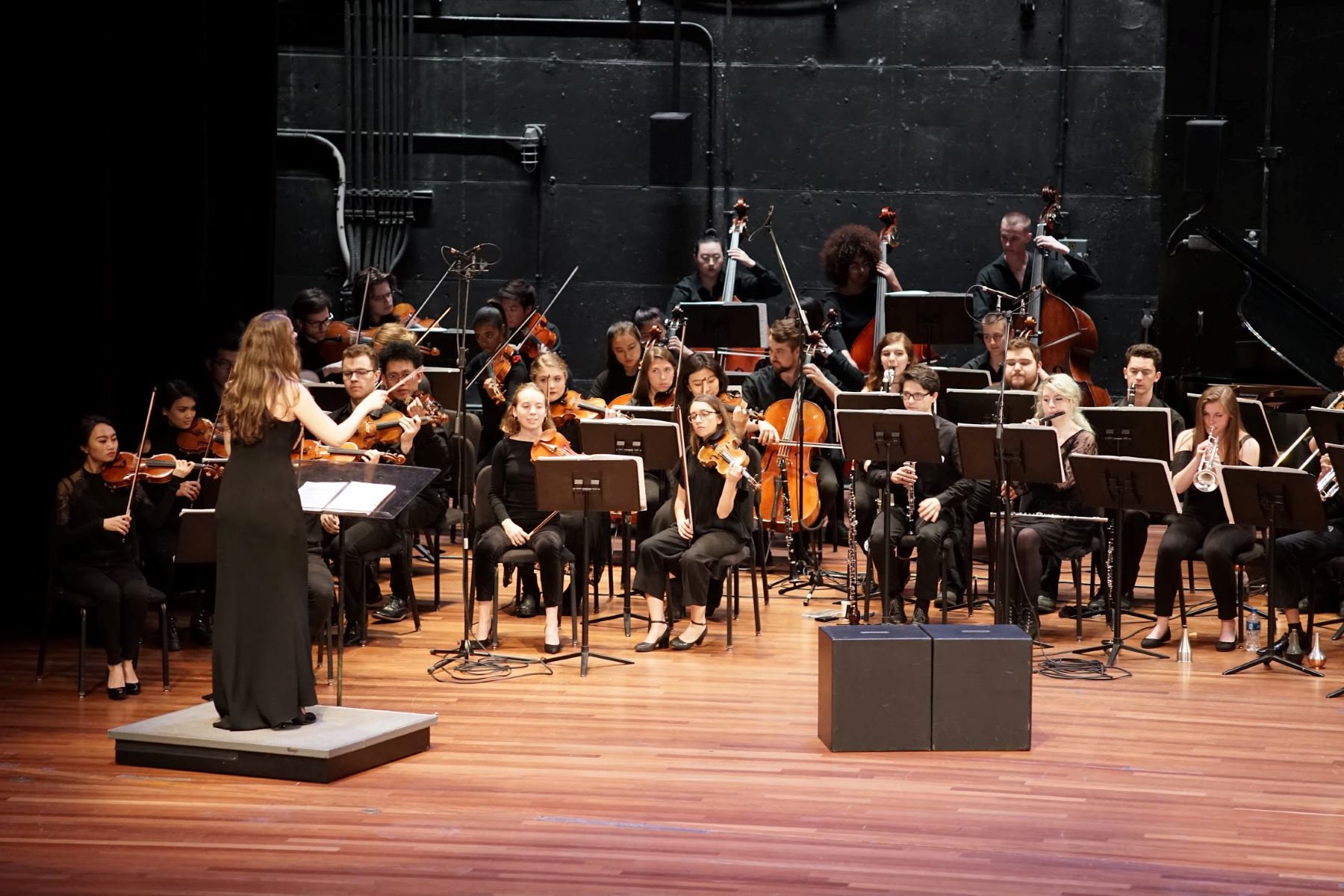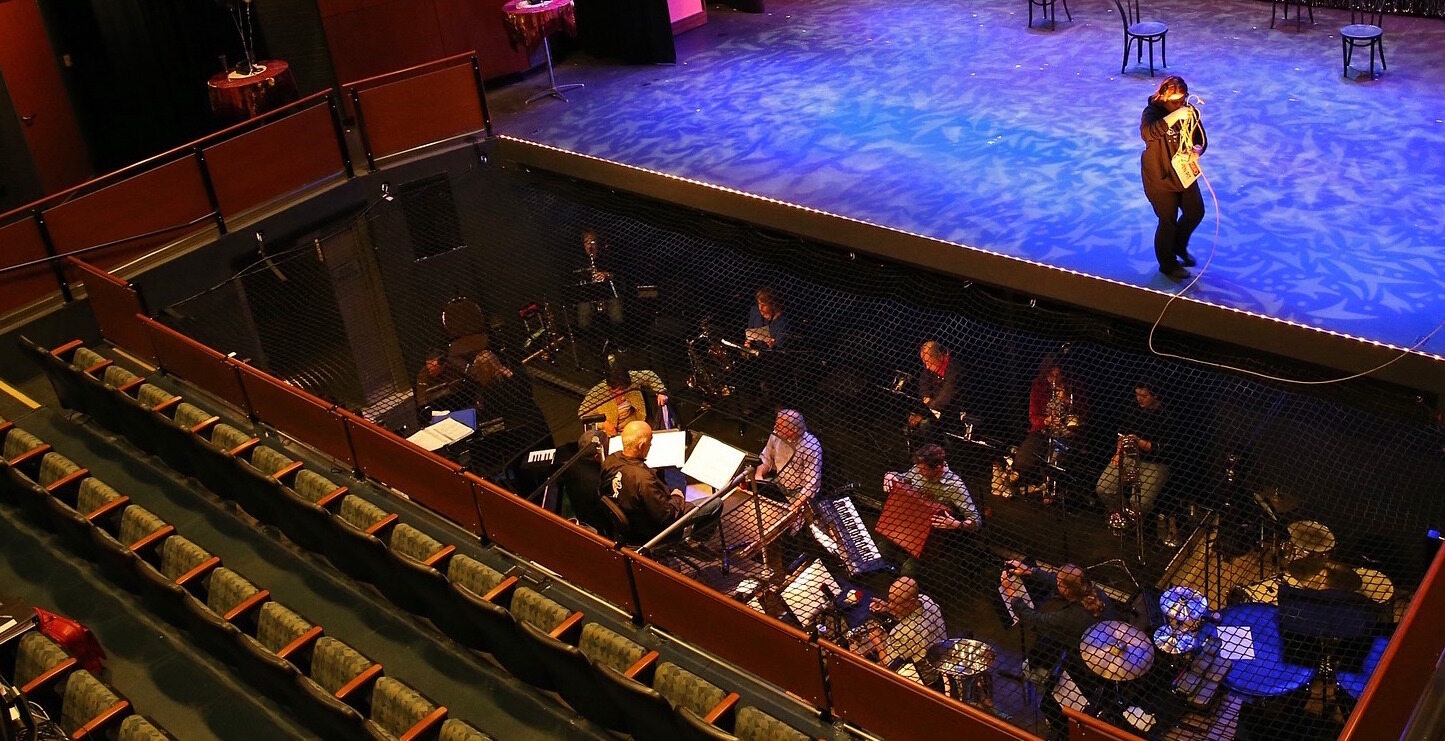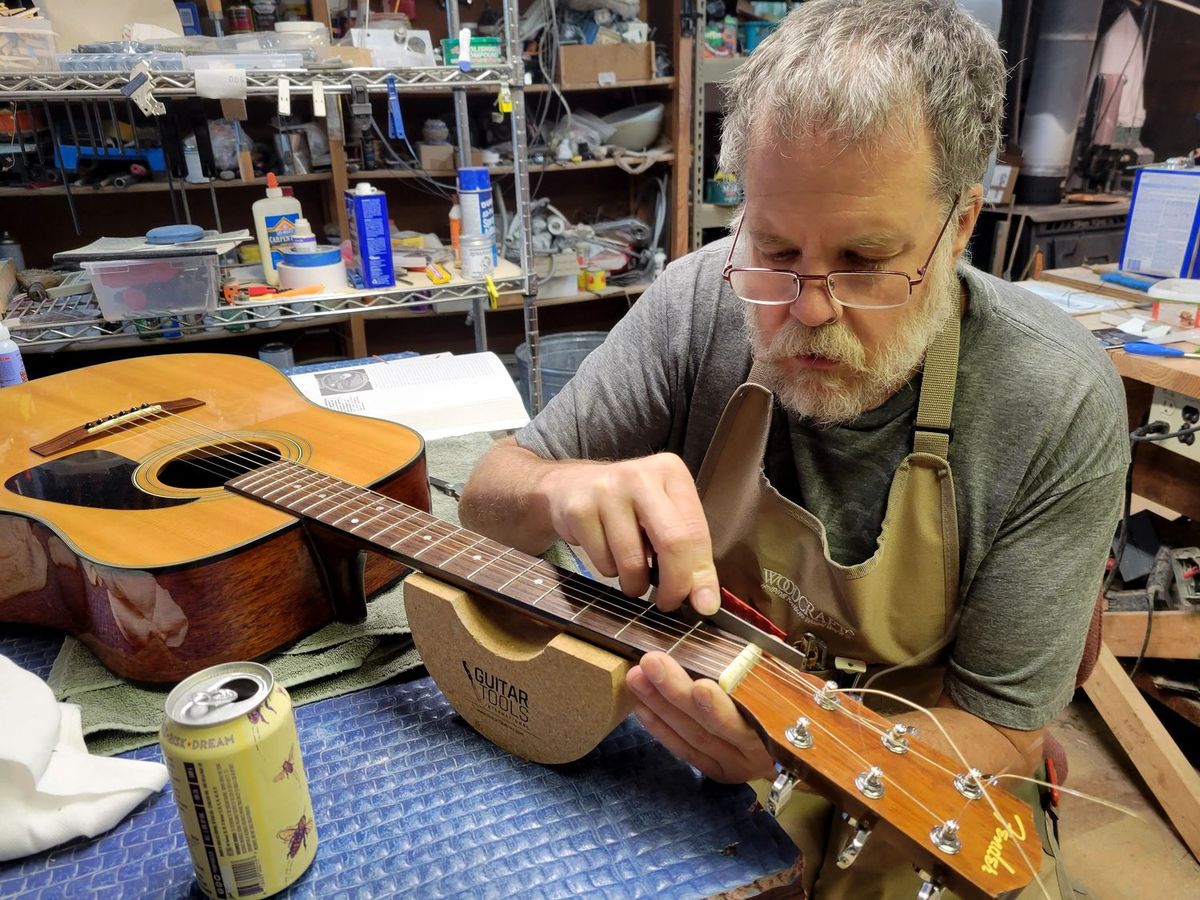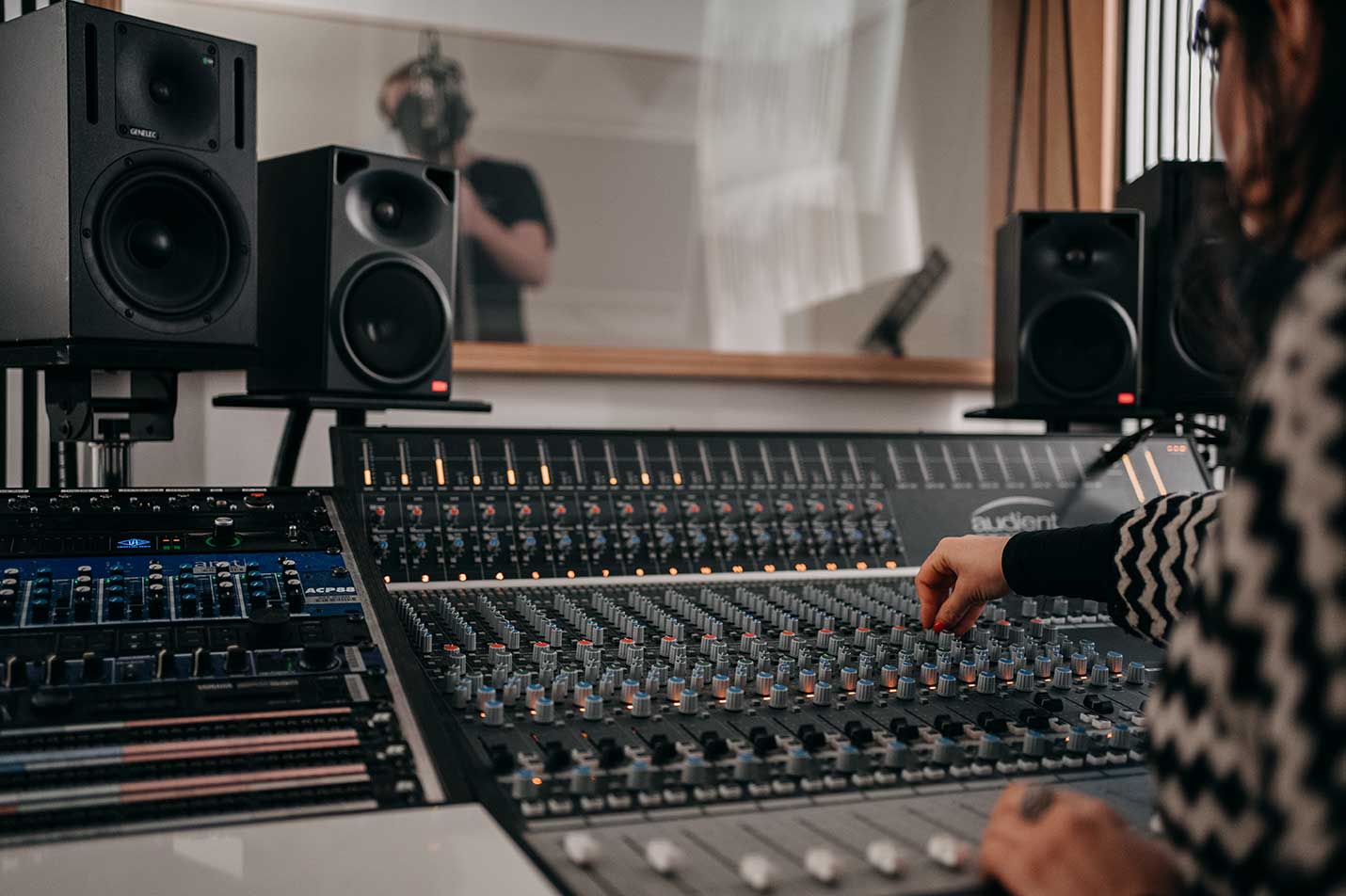Home>Production & Technology>Musician>How To Become A Broadway Pit Musician


Musician
How To Become A Broadway Pit Musician
Modified: February 24, 2024
Learn how to become a skilled Broadway pit musician and explore the world of music. Start your journey as a musician today and embrace the excitement of the stage.
(Many of the links in this article redirect to a specific reviewed product. Your purchase of these products through affiliate links helps to generate commission for AudioLover.com, at no extra cost. Learn more)
Table of Contents
Introduction
Imagine sitting in a dimly lit orchestra pit, surrounded by talented musicians, as the thrilling overture of a Broadway show begins to fill the theater. As a Broadway pit musician, you are at the heart of the magic, bringing the music to life and setting the stage for unforgettable performances night after night.
Broadway pit musicians are an essential part of the live theater experience. They perform in the orchestra pit, often located beneath the stage, and provide the musical accompaniment for Broadway productions. From beloved classics to new and innovative shows, these skilled musicians help create the vibrant and immersive world of musical theater.
But what does it take to become a Broadway pit musician? This career path requires not only exceptional musical talent but also a deep understanding of the intricacies of live performances and the ability to work collaboratively with a diverse team. In this article, we will explore the world of Broadway pit musicians, diving into their roles, responsibilities, required skills, and the path to breaking into this enchanting field.
What is a Broadway Pit Musician?
A Broadway pit musician is a highly skilled instrumentalist who performs in the orchestra pit during Broadway productions. The orchestra pit is a designated area usually located beneath the stage, where the musicians sit and play the music for the show. These musicians are an integral part of the live theater experience, providing the musical foundation for the actors, singers, and dancers on stage.
As a Broadway pit musician, your role is to bring the music to life and ensure that the audience hears a flawless and captivating performance. You will be playing alongside a group of talented musicians who collectively create a symphony of sound that supports and enhances the storytelling on stage. Your instruments may include strings, woodwinds, brass, percussion, and keyboards, depending on the requirements of the production.
Every Broadway production has its unique musical score, which can range from soaring ballads to catchy show tunes and intricate orchestrations. As a pit musician, you will be responsible for interpreting and performing these compositions with precision and artistry. You must have a strong sense of rhythm, excellent sight-reading skills, and the ability to adapt to various musical styles and genres.
In addition to playing the music, pit musicians also work closely with the conductor, who leads and guides the orchestra during performances. You must be able to follow the conductor’s cues, tempo changes, and dynamics to ensure a synchronized and cohesive performance. Communication and teamwork among the musicians and conductor are essential to create a seamless and professional musical experience.
Being a Broadway pit musician is not just about technical proficiency; it’s also about the ability to play with emotion and nuance. Your playing should evoke the intended mood of each scene, from heartfelt moments to joyful celebrations. You will have the opportunity to collaborate and interact with the cast and crew of the production, contributing to the overall artistic experience.
Now that you have an understanding of what it means to be a Broadway pit musician, let’s explore the specific roles and responsibilities of this captivating profession.
Roles and Responsibilities
As a Broadway pit musician, you have several important roles and responsibilities. These tasks ensure that the music seamlessly accompanies and enhances the theatrical performances. Let’s delve into the key responsibilities of a Broadway pit musician:
- Musical Accompaniment: Your primary role is to provide musical accompaniment for the entire production. You will be reading sheet music, following the conductor’s cues, and playing your instrument with precision and emotion.
- Ensemble Playing: Collaboration and teamwork are crucial in the pit. You will be working closely with other pit musicians, blending your sound harmoniously to create a cohesive and balanced musical performance. The ability to listen and adapt to the dynamics of the ensemble is essential.
- Sound Dynamics: One of your responsibilities is to understand and execute the desired sound dynamics of the production. This includes playing softly or loudly, adjusting volume levels, and conveying the emotions conveyed by the music.
- Cue Awareness: Paying attention to cues is of utmost importance. You must follow the conductor’s gestures, instrument cues, and visual cues from actors on stage. Being well-rehearsed and attentive ensures that you enter at the right time and stay in sync with the overall performance.
- Adaptability: Broadway shows often have a dynamic nature. Changes can occur, such as alterations to the music or unexpected cues from actors. As a pit musician, you need to be flexible and adapt to such changes seamlessly, making adjustments on the fly while maintaining a high level of professionalism.
- Instrument Maintenance: Taking care of your instrument is also part of your responsibilities. Regular maintenance, such as tuning, cleaning, and repairing, ensures that your instrument is in optimal condition to produce the desired sound quality.
By fulfilling these roles and responsibilities, Broadway pit musicians contribute to the overall success of a production, creating a harmonious and captivating musical experience for both the performers and the audience.
Now that we have explored the roles and responsibilities of Broadway pit musicians, let’s discover the skills and qualifications necessary to excel in this profession.
Required Skills and Qualifications
Being a Broadway pit musician requires a combination of technical proficiency, musical talent, and a deep understanding of live performances. Here are some of the essential skills and qualifications needed to excel in this field:
- Musical Proficiency: You must have advanced skills on your chosen instrument(s). This includes strong sight-reading ability, technical mastery, and a deep understanding of musical theory. Excellent intonation, rhythm, and tone production are also crucial.
- Ensemble Playing: Effective collaboration with other musicians in the orchestra pit is essential. You should be able to blend your sound seamlessly with the ensemble, listen and respond to fellow musicians, and maintain balance and coherence within the musical performance.
- Sight-Reading: Broadway musicians often encounter new music or changes to existing arrangements. The ability to quickly and accurately read and interpret music is critical. Sight-reading skills allow you to adapt to last-minute changes and perform with confidence.
- Adaptability: The world of live theater can be unpredictable. You must be able to adapt to changes in tempos, cues, or dynamics during a performance. This requires flexibility, quick thinking, and the ability to maintain composure under pressure.
- Professionalism: As a Broadway pit musician, you must demonstrate a high level of professionalism and dedication. This includes punctuality, preparedness, and a positive attitude. You should be able to handle long rehearsals, demanding schedules, and the intense performance environment with grace and professionalism.
- Communication: Good communication skills are crucial in the orchestra pit. Being able to effectively communicate with the conductor, fellow musicians, and other members of the production team ensures a smooth and coordinated performance.
- Emotional Expression: As a pit musician, you need to bring the music to life by conveying the appropriate emotions and mood of each scene. The ability to infuse your playing with expression and sensitivity is essential for creating an engaging and impactful performance.
- Continuous Learning: The music industry is constantly evolving, and as a Broadway pit musician, you should have a passion for continuous learning and growth. Keeping up with new musical styles, techniques, and trends will contribute to your success in this field.
While there is no specific educational requirement to become a Broadway pit musician, many professionals have a background in music education or hold a degree in music performance. Formal training can provide a strong foundation and help refine the necessary skills needed for a successful career as a Broadway pit musician.
Now that we have explored the required skills and qualifications, let’s delve into the training and education options available to aspiring pit musicians.
Training and Education
To become a Broadway pit musician, a combination of formal training and practical experience is essential. While there is no specified educational path, many successful pit musicians have a solid foundation in music education and performance. Here are some training and education options to consider:
- Music Education Programs: Pursuing a degree in music education or music performance from a recognized institution can provide a strong foundation in music theory, history, and performance techniques. These programs often offer specialized courses for various instruments and provide opportunities to participate in ensembles and gain practical experience.
- Private Lessons: Taking private lessons with a skilled and experienced instructor can greatly enhance your musical abilities. A private teacher can provide personalized guidance, technique development, and repertoire selection tailored to your specific instrument and career aspirations.
- Ensemble Experience: Participating in orchestras, bands, or chamber groups can help you develop ensemble playing skills and gain valuable performance experience. This could include community-based ensembles, school orchestras, or regional groups.
- Master Classes and Workshops: Attending master classes and workshops conducted by renowned musicians can offer valuable insights and networking opportunities. These events often focus on specific areas of musical expertise or provide guidance on audition techniques and professional development.
- Internships and Apprenticeships: Seeking out internships or apprenticeships with professional orchestras or theater companies can provide hands-on experience and exposure to the world of Broadway pit music. You may have the opportunity to observe rehearsals, work closely with experienced musicians, and gain insight into the inner workings of a pit orchestra.
- Continuing Education: The learning doesn’t stop after formal education. Continued professional development through workshops, master classes, and participating in professional ensembles or orchestras can help you refine your skills and stay current with industry trends.
Remember, building a successful career as a Broadway pit musician is not solely dependent on formal training. Practical experience, networking, and a strong work ethic are equally important. Taking advantage of performance opportunities, connecting with other musicians, and continuously honing your skills will contribute to your growth as a pit musician.
Now that we have explored the training and education options, let’s move on to the auditioning process and how you can land a gig as a Broadway pit musician.
Auditioning Process
The auditioning process for Broadway pit musicians can be highly competitive. It is essential to be well-prepared and showcase your musical talent and skills. Here are the key steps involved in the auditioning process:
- Research and Preparation: Begin by researching upcoming Broadway shows and their musical requirements. Familiarize yourself with the show’s score, instrumentation, and musical style. Prepare the required audition repertoire, ensuring it showcases your technical abilities and musicality.
- Find Audition Notices: Stay updated with audition notices by subscribing to industry websites, joining musician organizations, and following casting agencies. These sources often provide information on upcoming auditions for Broadway shows.
- Submit Application Materials: When you find a suitable audition opportunity, submit your application materials, which usually include a resume, repertoire list, and sometimes a recorded audition video. Follow the application guidelines provided by the casting agency or production team.
- Live Auditions: If your application is accepted, you may be invited for a live audition. Prepare your audition pieces thoroughly and practice them in various tempos and dynamics. Be punctual, professional, and dress appropriately for the audition.
- Performance and Sight-Reading: During the audition, you will typically be asked to perform your prepared audition pieces. Sometimes, you may be given sight-reading exercises to assess your ability to read music on the spot. Maintain composure, focus, and confidence throughout the performance.
- Interview and Collaboration: The audition may also involve an interview with the production team or the conductor. They may ask questions about your experience, ability to work in a team, and your understanding of the show. Display professionalism, enthusiasm, and a willingness to collaborate.
- Callback Auditions: In some cases, you may be called back for a second or third round of auditions. These callbacks allow the production team to further assess your compatibility and fit within the ensemble. Be prepared to perform additional pieces or participate in group auditions.
- Networking: Networking can play a significant role in landing auditions. Attend industry events, connect with other musicians, and build relationships within the Broadway community. Word of mouth and recommendations from colleagues can open doors to audition opportunities.
Remember, the auditioning process can be unpredictable and competitive. Embrace each audition as a valuable learning experience and an opportunity to showcase your skills. Even if you don’t get selected for a particular show, every audition helps you grow as a musician and expands your network within the industry.
Now that we have explored the auditioning process, let’s discuss the importance of networking and building connections in the world of Broadway pit musicians.
Networking and Building Connections
In the competitive world of Broadway pit musicians, networking and building connections can be instrumental in advancing your career. It not only opens doors to auditions and job opportunities but also helps you establish relationships with industry professionals. Here are some strategies for effective networking:
- Industry Events: Attend industry events, such as music conferences, workshops, and masterclasses. These events provide opportunities to meet and connect with fellow musicians, conductors, and casting directors. Engage in conversations, exchange contact information, and follow up with people you meet.
- Join Professional Organizations: Joining professional organizations, such as musicians unions, can provide access to resources, workshops, and networking events. These organizations also advocate for musicians’ rights and provide support in navigating the industry.
- Collaborate with Local Musicians: Connect with musicians in your local community and participate in musical collaborations. This could involve playing in community orchestras, participating in jam sessions, or joining bands. Building relationships with fellow musicians can lead to future professional opportunities and recommendations.
- Connect through Social Media: Utilize social media platforms, such as LinkedIn and professional musician networks, to expand your network. Share your musical achievements, collaborate with other musicians online, and engage with industry professionals and musical theater communities.
- Attend Auditions and Open Calls: Even if you are not actively auditioning, attending auditions and open calls can be an opportunity to meet other musicians and industry professionals. Engage in conversations during breaks and establish connections that may lead to future collaborations or job offers.
- Seek Mentorship: Finding a mentor within the Broadway pit musicians’ community can provide valuable guidance and support. A mentor can offer insights into the industry, share their experiences, and provide advice on career development. Seek out experienced professionals who are willing to share their expertise.
- Keep in Touch: After meeting someone in the industry, maintain ongoing communication by sending follow-up emails, attending their performances, or inviting them to yours. Keeping a genuine connection alive can lead to fruitful professional relationships down the line.
Remember, networking is not just about what others can do for you, but also what you can offer in return. Be supportive, kind, and genuinely interested in others’ work. Building a strong network is a long-term endeavor that requires patience and dedication.
Now that we have explored the importance of networking, let’s move on to understanding what it takes to prepare for a pit gig as a Broadway musician.
Preparing for a Pit Gig
Preparing for a pit gig as a Broadway musician requires attention to detail and diligent practice. Here are some key steps to ensure you are fully prepared:
- Study the Score: Obtain the musical score for the production and study it thoroughly. Familiarize yourself with the music, tempos, dynamics, and any special instructions indicated by the composer. Understand the structure of the show, including cues, transitions, and key musical moments.
- Practice Sight-Reading: Broadway pit musicians often encounter new music on short notice. Practice sight-reading regularly to improve your ability to read and interpret music quickly. This skill will enable you to adapt to any last-minute changes or additions to the score.
- Attend Rehearsals: Rehearsals are a critical part of the preparation process. Attend all rehearsals scheduled by the production team to familiarize yourself with the director’s vision, the conductor’s interpretation, and the overall musical direction. Pay attention to cues, dynamics, and feedback given by the conductor or musical director.
- Practice with a Metronome: Working with a metronome is essential to develop a strong sense of timing and precision. Practice your parts with a metronome to ensure you maintain a consistent tempo throughout the performance.
- Maintain a Practice Routine: Set aside regular practice sessions to hone your skills, refine difficult passages, and improve your musicality. Focus on technical exercises, scales, and the specific challenges presented in the musical score. Dedicate time to practice both individually and in ensemble settings.
- Emphasize Articulation and Expression: Pay attention to articulation and phrasing in the music. Experiment with different articulation techniques to bring out the intended musical expression. Work on dynamics, accentuation, and shaping the music to enhance its emotional impact.
- Collaborate with Other Musicians: If possible, rehearse with other pit musicians to develop a cohesive sound and collectively identify any potential issues or challenges. This collaboration will help ensure a synchronized and polished performance.
- Take Care of Your Instrument: Regularly maintain and ensure the proper functioning of your instrument. Keep it clean, properly tuned, and address any necessary repairs. Take care of your instrument to ensure optimal sound quality during performances.
- Stay Physically and Mentally Prepared: Being a Broadway pit musician requires stamina and focus. Take care of your physical and mental well-being by getting enough rest, staying hydrated, and maintaining a healthy lifestyle. This will help you stay alert and perform at your best during long rehearsals and performance runs.
Remember, preparation is key to delivering a stellar performance as a Broadway pit musician. The more familiar you are with the music and the nuances of the production, the more confident and prepared you will feel on stage. Embrace the process of preparation and enjoy the journey of bringing the music to life.
Now that we have discussed the preparation process, let’s explore the challenges and rewards of being a Broadway pit musician.
Challenges and Rewards of Being a Broadway Pit Musician
Being a Broadway pit musician comes with its share of challenges and rewards. Let’s explore both aspects of this captivating profession:
Challenges:
- High Pressure Environment: Broadway productions are known for their fast-paced and demanding nature. As a pit musician, you will need to perform flawlessly even under challenging circumstances such as quick tempo changes or unexpected cues.
- Adapting to Different Shows: Each Broadway production has its unique musical requirements and styles. Pit musicians must be versatile and adapt to various genres ranging from classical to contemporary, sometimes within the same show.
- Long Hours: Rehearsals and performances can require long hours of focused playing. Stamina and physical endurance are necessary to maintain consistent performance quality throughout grueling schedules.
- Continuous Learning: The music industry evolves constantly, and Broadway pit musicians need to keep up with new musical trends, styles, and technologies. Continuing education and staying updated can be challenging in a field that demands constant growth and improvement.
- Tight Schedules: Broadway shows typically have tight schedules with little room for error. Pit musicians must master complex music within limited rehearsal time and be ready to perform at a moment’s notice.
Rewards:
- Being Part of the Magic: Broadway performances are enchanting experiences, and as a pit musician, you are an integral part of that magic. You contribute to the emotional impact of the show, creating an immersive experience for the audience.
- Collaboration and Camaraderie: Working in a tightly knit ensemble of talented musicians fosters a sense of camaraderie and shared artistry. The teamwork and musical collaboration in the orchestra pit make every performance a memorable experience.
- Professional Growth: Broadway pit musicians have the opportunity to work with renowned conductors, directors, and performers. Collaborating with industry professionals helps broaden musical horizons and enhances professional growth.
- Contributing to Theatrical Excellence: Pit musicians play a crucial role in the success of a Broadway production. Knowing that your musical contributions play a significant part in the overall artistic excellence of a show is highly rewarding.
- Connecting with the Audience: The energy and response from a live audience make every performance unique and exhilarating. The connection made through live music and the ability to evoke emotions in the audience is a rewarding experience for pit musicians.
Despite its challenges, being a Broadway pit musician can be a fulfilling and enriching career. The ability to create stunning music, collaborate with talented professionals, and contribute to the transformative power of live theater makes it a passionate pursuit for many musicians.
Now that we have explored the challenges and rewards of being a Broadway pit musician, let’s conclude our journey through this captivating field.
Conclusion
Becoming a Broadway pit musician is a dream for many musicians. It requires a unique blend of technical excellence, adaptability, and a deep passion for live performance. Throughout this article, we have explored the world of Broadway pit musicians, from understanding their roles and responsibilities to the skills and qualifications required to excel in this field.
Broadway pit musicians are the unseen heroes, bringing the music to life and setting the stage for unforgettable performances night after night. Their ability to seamlessly collaborate with other musicians, follow the conductor’s cues, and adapt to the ever-changing demands of each show is vital in creating a captivating musical experience for audiences.
While the journey to becoming a Broadway pit musician may be challenging, the rewards are immense. From being part of the magic of live theater to the sense of camaraderie among fellow musicians, the profession offers a unique opportunity to contribute to the artistic excellence of Broadway productions. The connection made with audiences through the power of music is a gratifying and fulfilling experience.
Whether it’s mastering complex musical arrangements, navigating tight schedules, or continuously evolving alongside the ever-changing landscape of Broadway, pit musicians are dedicated professionals who bring their skills, passion, and artistry to each and every performance.
If you have the musical talent, the dedication, and the drive to pursue this thrilling career, take the necessary steps to develop your skills, network with industry professionals, and seize every opportunity to showcase your talent. Embrace the challenges, celebrate the rewards, and embark on the rewarding journey of being a Broadway pit musician.
So, let the overture begin, and may your musical journey thrive as you join the extraordinary world of Broadway pit musicians!











